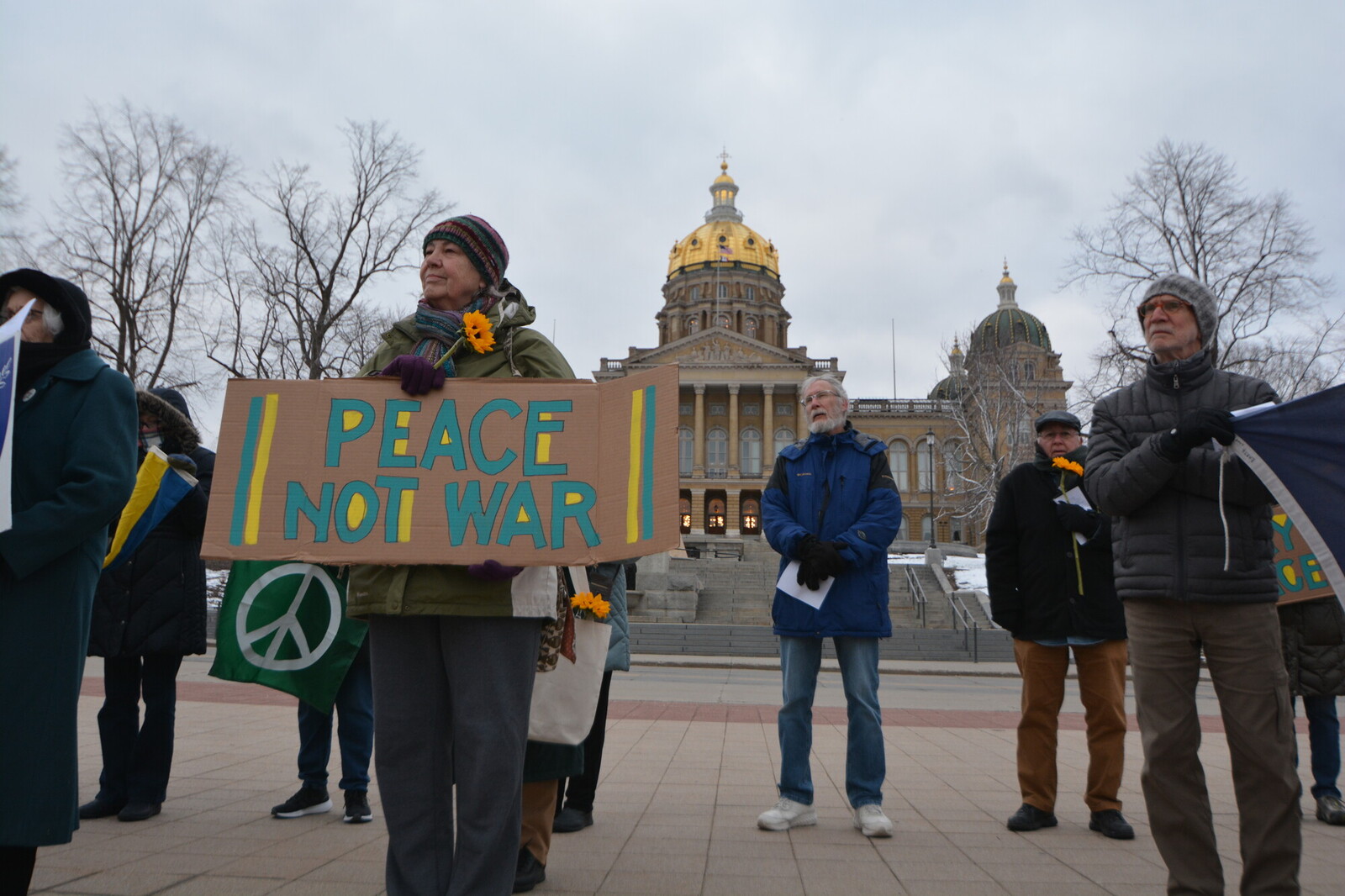
Vigil for peace in Ukraine. Jon Krieg/AFSC
I was living in Ramallah as the U.S. launched its 2003 invasion of Iraq. It was the third year of the Second Intifada— the Palestinian uprising against Israeli occupation that lasted from 2000 through 2005. We had spent nine months of the previous year living under curfew. Israeli soldiers had reinvaded the Palestinian cities from which they had withdrawn less than a decade earlier. Tanks and soldiers filled our streets. We fell asleep every night to the sound of gunfire. Death was a daily reality.
From Ramallah, it was hard to understand what the U.S. was thinking. The idea that the U.S. would be welcomed as liberators that was then being sold by U.S. politicians seemed like a delusional fantasy. I looked at my neighbors and friends who despised the Palestinian Authority but who took to the streets to protests in front of tanks when the PA was threatened by Israel. I knew that no matter how much people disliked Saddam Hussein, a homegrown authoritarian was preferred to a foreign invader and occupier.
The anti-war movement in the U.S. was on the march, and many—including AFSC—warned of the likely costs of the coming war. We were ignored and our predictions came true. The price of the Iraq war has been paid in lives, money, and security.
At least 200,000 people—mostly Iraqi civilians—were killed or died as a result of the war and its impacts.
To date, the war has cost U.S. taxpayers at least $2 trillion dollars. The Brown University Cost of War project estimates that the U.S. has spent at least $8 trillion dollars on wars since 9/11, and within a few years, the ever-expanding annual U.S. military budget will reach one trillion dollars.
The war also created Al-Qaeda in Iraq, ISIS, and ongoing instability and conflict across the Middle East. During February 2023 alone, the U.S. carried out 33 military operations in Iraq, and 17 in Syria as part of an ongoing undeclared war against ISIS. While most U.S. troops have left Iraq, U.S. military forces are still actively engaged in conflict in Iraq.
The war in Iraq was an unmitigated disaster and it is beyond time that we listened to those calling for a change in course. The ongoing reality of endless war is unsustainable.
There are three concrete steps that the U.S. can take to bring change:
1. Repeal the 2002 Iraq AUMF
Despite the formal end of the war in Iraq nearly 12 years ago, the Iraq AUMF remains in place and is still used to justify ongoing war and violence. It is how the Obama administration justified military actions in Syria and Iraq against ISIS—both the Trump and Biden administrations have used it for the same reason. The Trump administration used the 2002 AUMF to justify its assassination of Iranian general Qassem Soleimani, and others have argued that it allows further attacks on Iran.
Although the Biden administration has indicated that it is willing to repeal the 2002 AUMF, the administration—and Congress—have not acted.
2. Ensure accountability for those who committed war crimes and abuses during the war.
While a few “bad apples” were tried for abuses committed at Abu Ghraib Prison, there has been no accountability for the systematic torture of detained men carried out by the U.S. military, CIA, and other contractors. The deaths of tens of thousands of civilians in Iraq have been ignored. Those responsible for kidnapping people around the globe, detaining them without trial, and sometimes sending them to third countries to be tortured or disappeared have not been held to account. The prison at Guantanamo Bay, where men have been held for close to two decades without charge or trial, remains open. Nobody has been held to account for the thousands of people killed, including U.S. citizens, as a result of assassination programs that sent drones to drop bombs on taxis, wedding parties, and homes.
The impunity that has been granted to U.S. officials for their abuses has real consequences in the present. In early March, The New York Times reported that the Pentagon is blocking the U.S. government from sharing information on potential war crimes committed by Russia in the Ukraine with the International Criminal Court for fear that facilitating an investigation of Russian abuses would open up the possibility of investigations into U.S. abuses around the globe. Impunity makes everyone less safe.
3. Invest in peace.
The U.S. military budget is now over $850 billion dollars. This is approximately the same amount as all other U.S. discretionary spending combined. It is also more money than the combined military budgets of the next nine top spenders--most of whom are U.S. allies. This spending has offset costs in the U.S. where health care, infrastructure, and education all remain under resourced, at least partly because we refuse to stop continually increasing military spending.
Our investments define how the U.S. sees and responds to problems in the world. If the only tools that we invest in are military tools, then our responses to problems and challenges will be militarized responses.
At a moment when Russia has pulled itself out of the last cold war era nuclear non-proliferation treaty and global escalation and war in response to the situation in the Ukraine is not unthinkable, the lack of non-militarized tools for addressing conflict should set off alarm bells.
We are at the edge of a precipice, and we need to invest in the tools that will help us move back to more stable ground. Iraq should teach us that military responses are not the right path. Alternate solutions are needed, and investment in peacebuilding and diplomacy can provide those alternatives.
